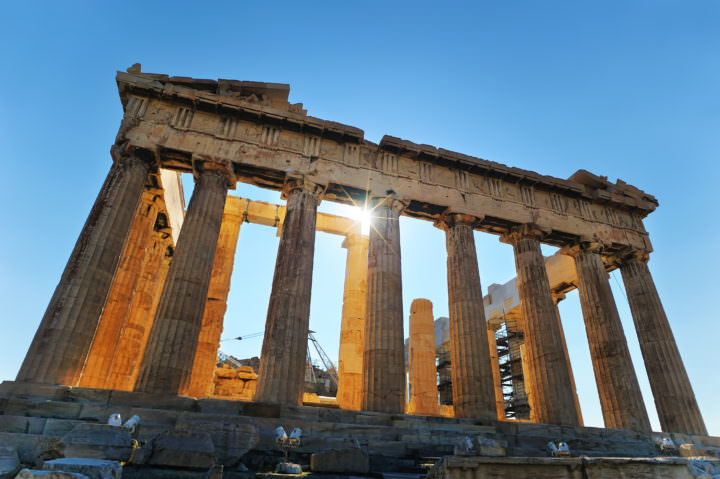Cylon Tries and Fails to Takeover Athens
Comments Off on Cylon Tries and Fails to Takeover Athens
 The city-states were among the first units of government in Ancient Greece following the collapse of the Mycenaeans. Most of these city city-states developed naturally as populations in certain areas increased. Since the city-states operated as individual units, everything about those individual areas was self governed. Ancient Greece as we understand it didn’t have one governing body. In some places, like Athens, the city-state system provided the foundation where democracy was eventually developed.
The city-states were among the first units of government in Ancient Greece following the collapse of the Mycenaeans. Most of these city city-states developed naturally as populations in certain areas increased. Since the city-states operated as individual units, everything about those individual areas was self governed. Ancient Greece as we understand it didn’t have one governing body. In some places, like Athens, the city-state system provided the foundation where democracy was eventually developed.
Today, we see the development of democracy as truly groundbreaking. Back then, however, there were those who didn’t embrace it. Cylon, an Athenian nobleman, was one of these people. Here’s more information about him and what he ultimately did about his discontent over the new political system:
Cylon and His Relationship With Democracy
These individual political units provided freedoms for the common man and were the beginnings of a democratic system in which individuals had the right to voice their opinions, and cast votes on specific issues. Some did not meet the change from a ruling system led by those of nobility to giving more power to the people with open arms. Many members of the high class did not want to lose their power that previously was bestowed upon them thanks to their fortunes or what property they owned.
One of the disgruntled nobles was a man by the name of Cylon. Cylon (sometimes spelled as Kylon) was one of the Athenian nobles who took issue with the change in political system. Not only was he of the upper class, but also he was well known in Athens as he was a winner of the Olympic Games. His victory brought him a lot of respect from the common people and was considered a hero by many.
Cylon and Theagenes
 Cylon furthered his status as a high-ranking individual by marrying the daughter of Theagenes, a tyrant who had taken over control of the city of Megara. This city, which still exists today, is located just to the northwest of the Athens, along the shores of the Aegean Sea.
Cylon furthered his status as a high-ranking individual by marrying the daughter of Theagenes, a tyrant who had taken over control of the city of Megara. This city, which still exists today, is located just to the northwest of the Athens, along the shores of the Aegean Sea.
Theagenes, a tyrant, had managed to take over Megara by slaughtering the herds of livestock owned by the rich members of the city (most likely Sheep). By killing the livestock, he took away the wealth and attached power held by the rich, and built confidence among the townspeople. With his tactical advantage, Theagenes pushed his way to power and is considered one of the first tyrants in Greek history.
Cylon was inspired by his father-in-law Theagenes for his actions in taking control of Megara, so much in fact that he enlisted Theagenes’ help to take over Athens. He eventually used all of the resources he had at his disposal to try to alter the course of history and do away with democracy in Athens.
Cylon Attempts to Take Over Athens
It is said that Cylon visited the Oracle at Delphi and was told to take control of Athens during the Festival of Zeus, which the Olympic Games were a part of. Having already participated in the Olympics and knowing that during the Games the city (including government officials) would be occupied, Cylon set his sights on the Olympics of 632 BC to make his move.
Using his political connections with Theagenes and leveraging his celebrity status, Cylon was able to rally enough support to establish a coup. However, his success was short-lived as as the nine Archons of Athens confronted him. . An Archon was usually the chief magistrate of a city-state, yet in Athens there was a council of nine archons who formed an executive government for the city. The magistrates stopped Cylon and forced him and his followers to retreat, who then ran to take cover in the Temple of Athena on the Acropolis.
After being held up in Athena’s temple, Cylon and his followers were persuaded by the Archons of Athens to leave the temple and stand trial. Cylon was promised his life would be spared if he appeared in court. However, shortly after Cylon and his men left the temple, they were stoned to death. Even though one power play was thwarted by the Athenian government, there were others who would soon come along to take control over Greece’s largest city.
Categorized in: Ancient Greek History
This post was written by Greek Boston
Share this Greek History Article:





